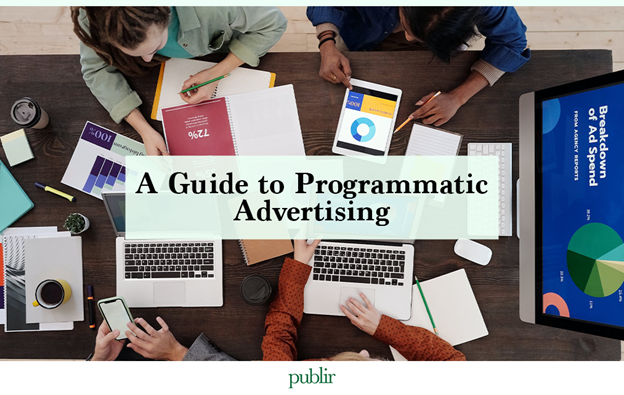
Programmatic advertising refers to the process of buying and selling advertisements in open digital marketspaces. Artificial intelligence and machine learning technologies manage the real-time placement, auction, and sale of digital advertisements. In traditional advertising, advertisers had to nurture a relationship with publishers to get their ads out.
Manual ad placements limited advertisers’ capacity for fully targeted ad placements. The same ad was displayed in traditional advertising regardless of who visited the website. On the other hand, programmatic advertising offers a truly user-centric, tailored, intelligent, and highly personalized advertising message to the right audience at the right time. Programmatic advertising targets the right audience at the right time in their customer journey using geolocation, website cookies, and keywords.
How Programmatic Advertising Works
Programmatic advertising has four components that place ads on different websites and platforms: demand-side platforms (DSP), supply-side platforms (SSP), and ad exchanges.
- DSP: DSP is an interface platform where you can buy advertisements. Based on your criteria, demand-side platforms identify the best publishers and platforms for programmatic advertising. DSPs place a bid on your behalf using real-time bidding.
- SSP: SSPs are used by publishers to make their website, radio, or channel spaces available for advertising and bidding.
- Ad Exchange: Ad exchanges manage the auctioning and bidding process by connecting SSPs and DSPs. It is similar to the bidding floor of a stock exchange. It provides a space for negotiation for publishers and advertisers to come to an agreement.
Methods for Programmatic Buying
There are three main types of programmatic buying:
- Real-Time Bidding: Also known as open auction, real-time bidding sets the price of an advertisement in real-time based on the bidding. Real-time bidding is available for both publishers and advertisers and is considered a cost-effective way of purchasing digital ad space. Real-time bidding is one of the most popular ways to purchase programmatic ads. While controlling the pricing, advertisers get an array of choices.
- Private Marketplace: It is an invitation-only space where publishers can offer their ad spaces to selected advertisers. The publisher puts out its space for auction, and advertisers bid on those spots. The publisher sets the prices and restrictions, but the purchases can be structured on campaign objectives.
- Programmatic Direct: Also known as programmatic guaranteed, this process involves direct sales between publishers and advertisers. In this process, publishers can regulate and monitor the cost of the ad spaces while advertisers can buy premium spaces more transparently. This differs from RTB, as advertisers can buy a guaranteed number of ad expressions instead of bidding for one ad at a time. This method is more aligned with traditional advertising as it comes with a fixed price agreement. Often one publisher works with one advertiser toward a specific deal.
Best Practices for Programmatic Advertising

Make programmatic advertising an invaluable part of your marketing strategy by following a few best practices
- Be Specific about the Goals You Want to Achieve Through Programmatic Advertising
Like all other digital marketing initiatives, set clear goals from the very beginning. To figure out your short-term and long-term goals, utilize your existing data and its trends. Build an effective marketing strategy based on those goals. Metrics like KPIs, profitability over time, and concentrated revenue streams are generally used by advertisers to measure the success of their advertisements.
- Understanding What Platforms to Use
There are two kinds of programmatic advertising platforms: Self-service and managed service platforms. Self-service platforms give you complete control over your advertisement purchases by signing up. They are mainly demand-side platforms that provide advertisers with access to ad channels and publishers.
Managed service means a third party, usually an agency, that will oversee all your programmatic advertising campaigns. They become an extension of your marketing team. This option is chosen if you need someone with deep knowledge, experience, and expertise in programmatic advertising. You will still be in charge of the creatives, branding, and strategy, but the external team will work with you to plan an effective marketing strategy.
- Preventative Methods to Minimize Bot Responses that Contaminate Your Data
Ad fraud is a crucial issue in programmatic advertising, costing advertisers millions of dollars annually. A recent Bad Bot Report by Imperva revealed that 40.8% of all the traffic on the internet in 2020 was non-human sourced. 25.6% of this came from malicious bots. To reduce ad fraud, ensure that your DSP works with verification vendors and has implemented Ads.text to reduce bot responses. Do not trust the deals that look too good to be true. Check that the ads comply with various privacy regulations and policies in relevant countries and states.
- Is Your Team Skilled Enough to Make the Most of Your Gains from Programmatic Advertising?
As mentioned above, managed service providers are experts in programmatic advertising. They have years of experience working with clients in different fields. If you have more specific needs and want to make an impact on your readers, you should delegate the task to a group of experienced media strategists. They will collaborate with your marketing team to understand your needs and design the best marketing strategy tailored for your audiences. This saves time and money in the long run.
As experts in the programmatic advertising market, Publir offers a one-of-a-kind unified platform designed to maximize earnings for digital content creators. We provide complete solutions for Ad Optimization, AdBlock Recovery, Subscriptions, and Crowdfunding. Curious to learn more? Visit us here or email us at sales@publir.com to get started today.
